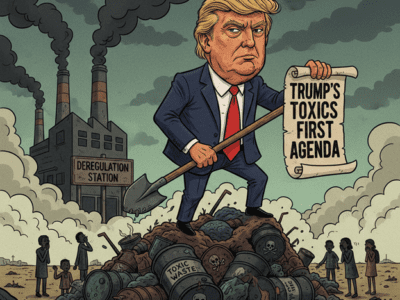A Loss for Trump — and for Coal
Trump Administration Loses Yet Another Environmental Case
Understandably, most of the attention at the beginning of the week was devoted to the rollout of the Trump Administration’s token effort to regulate greenhouse gases, the ACE rule. But something else happened, too. On Tuesday, a D.C. Circuit ruling ignored objections from the Trump Administration and invalidated key parts of a rule dealing with coal-ash disposal as being too weak. That rule had originally come from the Obama Administration, and the court agreed with environmentalists that it was insufficient. Trump’s efforts to weaken it further may have hit a fatal roadblock.
Coal ash is produced in huge quantities by coal-fired power plants. As the opinion describes, it’s just chock-full of toxic substances. Traditionally, the industry just dumps it, in dry or wet form, in a pond or reservoir. If it escapes suddenly, it can cause a massive toxic flood; if slowly, it can contaminate ground water.
The Trump Administration asked the court to hold its ruling in abeyance until it could issue a new rule or else remand several aspects of the rule for further consideration. The court did remand some aspects of the rule that industry had not challenged, but not one crucial part of the rule, dealing with “legacy sites” — that is, sites that are no longer receiving waste. The court agreed with environmentalists that requirements for these legacy sites were too weak. It also rejected industry’s claim that EPA lacks authority to regulate these legacy sites.
The statutory interpretation argument about legacy sites is interesting, not just for lawyers but for English teachers, since it turned on a grammatical issue. The statute gives EPA authority over sites at which “waste is disposed of.” Industry said that this phrase was in the present tense, so EPA could only regulate sites that are still actively used for disposal.. The judges in the majority found that the phrase was unambiguously in the past tense, thus including any place where disposed-of waste was found. The majority analogized to a teacher telling kids they have to clean up any desk where “water is spilled,” which definitely doesn’t just mean places where glasses are being tipped over right this minute. An even better analogy might be the phrase “where the bodies are buried” — a graveyard is certainly a place where “bodies are buried” even if it is no longer used for new burials.
The importance of the court’s ruling is that the Trump Administration will have to regulate these legacy sites, rather than having discretion to exempt them. (A concurring judge would have let EPA decide either way.) The Administration will also be stuck with other parts of the ruling, such as the demand for tougher standards governing the use of clay-lined disposal sites (which basically means tamped-down dirt.) All of this will ultimately make it more expensive for utilities to continue using coal.
There’s one other question of broad import in this case. Industry attacked EPA for failing to balance costs and benefits in determining what to do with sites that violated the regulatory requirements. EPA allowed these sites to stay open for five years if there was no alternative way to dispose of the waste, but industry wanted a broader exemption that considered the cost of alternate disposal methods.The court said that EPA did not have the discretion to consider costs because the statute specified health risks as the basis for regulation. Where a statute fails to specify criteria (as in a Supreme Court case, Michigan v. EPA), the agency must give some consideration to cost. But the D.C. Circuit quoted language in the Michigan opinion saying that, if a statute specifies non-cost factors, “the Act normally should not be read as implicitly allowing the agency to consider cost anyway.”
In fairness, I should point out that the Obama Administration was responsible for the weakness of this rule, but Trump wanted something even weaker than that. That plan is now in trouble, and in fact, EPA is probably going to have to strengthen the rule even more.
This decision caps off a run of adverse rulings by courts rejecting the positions of the Trump Administration. It’s going to make life more difficult for utilities using coal, and indirectly the coal industry, which Trump isn’t going to like. And all of these losses are a good sign going forward, as bigger Trump Administration initiatives start coming before the courts.
Reader Comments
3 Replies to “A Loss for Trump — and for Coal”
Comments are closed.






Does anyone happen to have a list or can anyone point me to a list of the “run of adverse rulings by courts rejecting the positions of the Trump Administration”?
Well Dan, here we are, still failing to inform, educate and motivate We The People to demand environmental actions that will protect our newest and future generations from the increasingly out of control environmental disasters we keep producing today.
You are proving one more (last?) time that Will and Ariel Durant are still right about fatal consequences when intellectuals fail to meet the challenges of change that are threaten our civilization.
Academic mutual admiration societies that only point fingers at corrupt and incompetent republicans and democrats in Washington still aren’t accomplishing anything.
Too bad academics won’t do anything to protect the human race from destruction caused by the male amygdala reported daily in news from Washington.
Maybe women can save us by taking over Washington (even though a senior female Berkeley social scientist once told me that women are not as dependable as I would like to believe). But let’s give it a try anyway, women can’t possibly be as destructive as Washington males are today.
Unless you folks have a better idea you can make happen in time to prevent global warming from destroying an acceptable quality of life on our planet.